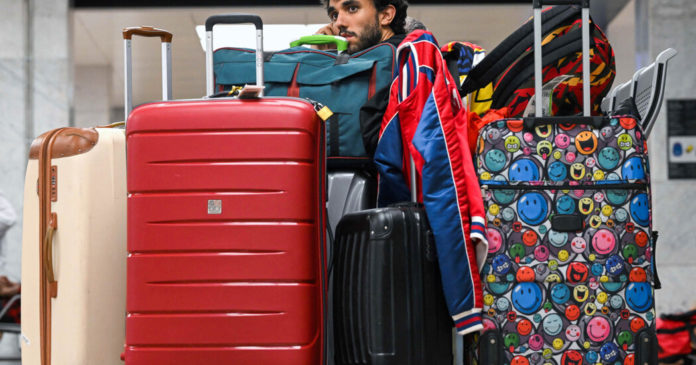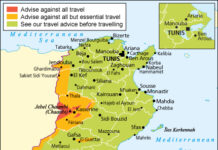
For many travelers, cancellations and other snags have made this summer especially frustrating. To help you understand how we got here and how to make the most of your own trips, two Times travel experts — Niraj Chokshi, who covers transportation, and Heather Murphy, who reports on how people travel — answered reader questions.
Why are so many flights getting canceled? — Anna, South Bend, Ind.
Niraj: It’s a confluence of issues. Demand is quite high. After two years when people were not able to travel or did not feel safe doing so because of Covid, summer travel is busy again. The other issue: Labor is in short supply. Both airlines and airports have been struggling to hire, which means that there haven’t been enough baggage handlers, wheelchair agents, ramp agents — all the way up to pilots.
To some extent, it is a problem of the airlines’ own creation. Early in the pandemic, when they were looking to trim costs, the airlines encouraged a lot of employees to leave through buyouts or early retirements. Ultimately, it looks as though that has come back to bite them.
Will the summer travel problems end by October for my destination wedding? — Martina Matheis, Stroudsburg, Pa.
Niraj: There is some hope. Major airlines have been staffing up aggressively, and those new employees should be fully trained soon. The industry should also get a bit of relief thanks to seasonality: The fall is traditionally less busy. Also, parts of the economy aren’t doing so great, which could mean that fewer people will be flying.
Do you think the price of airline tickets will ever go down? I’m broke, but need a vacation. — Cynthia Soegiharto, South Portland, Maine
Heather: Quite a few apps and websites — including Hopper, Kayak and Skyscanner — allow you, when you search your flight, to see what the prices will be at different time periods. I appreciate that the Hopper app will tell you if you should book right away because prices are likely to rise, or wait until they drop further.
Also, many airlines still allow people to change most flights without fees, so you can buy a flight and then, if you can find a cheaper flight on that same airline, you can change it and get a credit.
If an airline cancels your flight, what rights do you have as far as refunds or vouchers? — Susan, southern New Jersey
Heather: If your airline cancels your flight or significantly changes it, you are supposed to get your money back. It’s something that people don’t realize, and airlines sometimes instead offer people vouchers when they actually owe you that money. If you aren’t refunded automatically, you may have to call the airline or fill out an online form. If the money has not shown up in your bank account within several weeks of your request, you should tell your credit card company, and it can help you get your money back.
What steps should you take to plan for dealing with contracting Covid while you are on vacation? — Libby Bucholz, Cary, N.C.
Heather: It’s tempting to push it out of our minds, but you’re wise to come up with a plan in advance. Some, but not all, travel insurance policies will cover seven days of additional hotel costs as well as medical costs if you test positive. Particularly if you’re over 65 or medically compromised, you should check in with your primary care doctor and find out if he or she could prescribe you Paxlovid when you’re on the road.
You no longer have to test to return to the U.S. or travel to most countries, so it’s really on you to identify whether you have Covid before you fly home. C.D.C. guidance says that if you test positive, you should isolate yourself for five days and then wear a mask for the five days after that. (Heather gave more tips for post-restrictions travel here.)
What can I do to reduce the carbon footprint of my vacation? — Kevin Morooney, State College, Pa.
Niraj: The airlines I cover won’t appreciate me saying this, but: Fly less. Flying is a huge contributor to anyone’s carbon footprint and if it’s important to you, reconsidering how much and how far you travel is worth considering.
Should I ship my luggage overseas to avoid the chaos of losing it? — Carolyn Adams, Hilton Head Island, S.C.
Heather: If you need to travel with something that is so precious to you that if it is lost, it would destroy your life, then put it in a carry on. If it’s too big, it’s not a terrible idea to ship it. But I don’t think we are yet at the point where people need to stop checking their luggage.
For a big trip, is it better to use a travel agent or plan on my own? — June Sambrowski, Morris Plains, N.J.
Heather: Travel agents are great if you have the money to spend on them. With all of the travel chaos, and the horrible customer service offered by so many airlines, if you have a travel agent, they can be the one to wait on the phone for four hours instead of you.
Before working in journalism, Heather Murphy taught English at an institute in Chile with unconventional notions about essential words. Niraj Chokshi covers transportation, but his favorite way of getting around is walking with his wife and their dog, Kevin.
For more
-
A flight attendant with 20 years on the job answered reader questions.
-
It took 12 days for one Times reader to get her bags. Our Tripped Up columnist persuaded United to give her $3,000 in restitution — and still couldn’t believe it.
-
Airplane travelers seem to have an unspoken dress code: comfortable shorts, leggings and sweats — maybe even Crocs.
-
Some dog owners are shelling out thousands of dollars to charter flights for their pets, The Wall Street Journal reported.
NEWS
Politics
-
President Biden’s unpopularity is testing the strength of Democratic Senate candidates.
-
The Senate took a crucial step toward approving Democrats’ climate and tax bill, passing it in a test vote.
-
Abortion rights supporters worry that, as a lifelong Catholic, Biden is an awkward fit to lead a fight to restore Roe.
-
Conservative groups are trying to expand safe haven laws that allow women to surrender newborns with minimal interference.
-
The verdict against Alex Jones is unlikely to do much to slow the phenomenon of fabulists influencing the public, Kevin Roose writes.
International
-
Palestinian Islamic Jihad militants fired a barrage of rockets at Jerusalem, in fighting that has killed at least 31 people in Gaza. Follow our live updates.
-
Xi Jinping has strengthened China’s security apparatus, protecting against what he sees as threats from foreign forces.
-
Francia Márquez, who will become Colombia’s first Black vice president today, is an ambassador of an Afro-Colombian aesthetic boom.
Other Big Stories
-
Major employers in Indiana, including the pharmaceutical company Eli Lilly, criticized the state’s new near-total abortion ban.
-
Black families searching for ancestors have turned to 19th-century ads that thousands placed in newspapers seeking relatives after Emancipation.
FROM OPINION
-
Biden’s recent successes should make him confident in his legacy without needing a second term to secure it, Maureen Dowd argues.
-
The pro-life movement wanted a democratic contest over abortion. After the Kansas vote, it has one, says Ross Douthat.
-
People shape technology, but technology also shapes us, Ezra Klein writes.
-
Alex Jones’s trial was a rare — but still insufficient — win for the truth, Pamela Paul argues.
-
Don’t ask Marvel to recast the Black Panther; demand more Black heroes instead, says Roxane Gay.
The Sunday question: What does Ayman al-Zawahri’s death mean?
The killing of Al Qaeda’s leader shows the U.S. can still fight terrorism without troops in Afghanistan, says the Brookings Institution’s Vanda Felbab-Brown. But Zawahri’s presence in Kabul suggests that last year’s U.S. withdrawal and the Taliban’s return have again turned the country into a terrorist haven, Asfandyar Mir writes in The Times.
The Book Review podcast: Elisa Gabbert talks about poetry criticism.
THE SUNDAY TIMES MAGAZINE
Thanks for spending part of your weekend with The Times.
Claire Moses, Ian Prasad Philbrick, Tom Wright-Piersanti and Ashley Wu contributed to The Morning. You can reach the team at themorning@nytimes.com.








